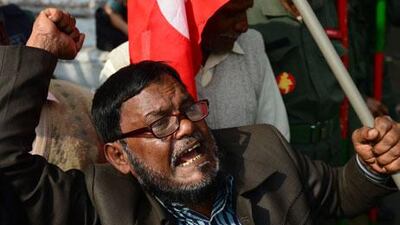DHAKA // Bangladesh's controversial war crimes court probing the nation's bloody independence war sentenced a top Islamic televangelist to death today in its first conviction.
Maolana Abul Kalam Azad, who has been on the run for the last year, was "sentenced to death by hanging" for genocide and murder committed during the 1971 liberation war against Pakistan, the judge Obaidul Hasan said.
The International Crimes Tribunal, which is a domestic tribunal with no international oversight, was created by the government in 2010 and has been tainted by allegations that it is politically motivated.
"It's a historic day for the country. It's victory for the humanity. Bangladeshi people have been waiting for this day. They can now heave a sigh of relief since 1971," said the attorney general Mahbubey Alam.
Azad, 63, who for years presented a widely watched show on Islam on private and state-run television channels, is a former leading light of Bangladesh's largest opposition Islamic party Jamaat-e-Islami.
In total, eleven senior opposition figures, nine from Jamaat and two from the main opposition Bangladesh Nationalist Party (BNP), stand accused of war crimes.
Both Jamaat and BNP have called the cases "politically motivated and farcical" and international rights groups have questioned the proceedings and found loopholes in the war crime laws.
Abdus Shukur Khan, a tribunal-appointed defence lawyer for Azad, said the case was "false".
"He was not involved in any of these crimes and was never named a Pakistani collaborator in any of the war books," he said.
Azad became known as "Bachchu the collaborator" during the war in his hometown in the district of Faridpur, where he was accused of murdering at least a dozen Hindus, the prosecutor Shahidur Rahman said.
"Six of them he shot dead himself and took part in a genocide," Mr Rahman said.
In the 1980s Azad became a regular speaker at a top mosque in Dhaka. His TV shows are said to have helped shape the country's Sufi-inspired Islam to that of the more austere Saudi-style Wahhabi Islam.
Azad, who also heads an Islamic charity, went into hiding and is believed to have fled the country immediately after the tribunal opened the case against him.

